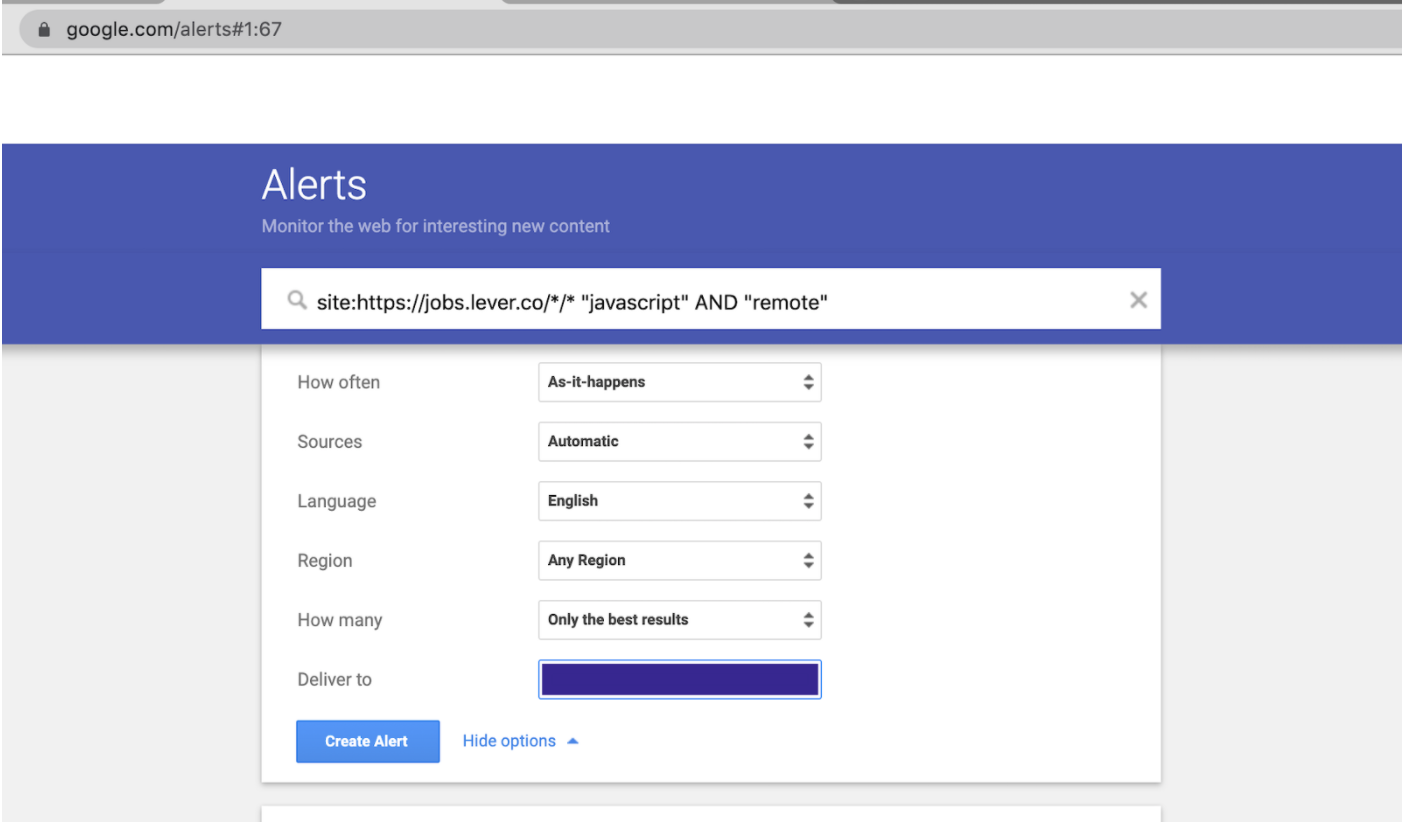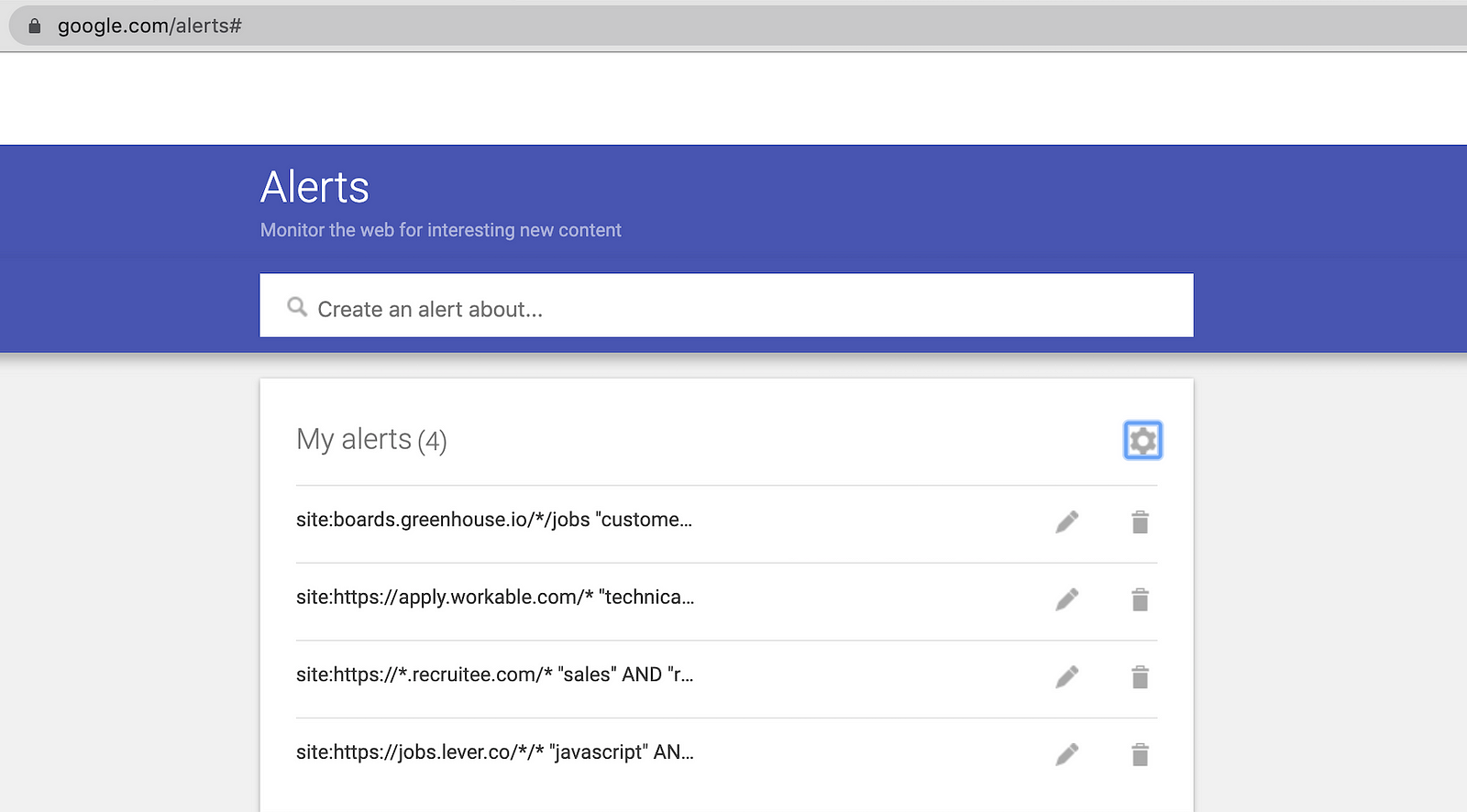Find hidden job postings faster for remote work, work from home
Try using Google Search operators and my hacks with it, here is a step-by-step walk-through. This can help you find job opportunities that are not advertised on any job boards. You can set up notifications for them and get to be one of the earliest applicants.

TL;DR: tired of seeing the the same job opportunities on job boards? Try using Google Search operators and my hacks with it, here is a step-by-step walk-through
I'm writing this article to share one of the best hacks to find the latest job opportunities the exist out there. I’ve helped many developers to find new remote jobs but even they, very technically savvy people, tend to underestimate the power of this technique.
It can help you find job opportunities that are not advertised on any job boards. You can set up notifications for them and get to be one of the earliest applicants. Let me dive right in.
The technique is called “Master of Google Search Operators”. I call it this way. But when I mention it to people in the context of job search, not many people understand how to actually use it.
Google search lets you optimize the search results that are returned to you. I mostly use 5 operators: site:, “” (quotation marks), * (asterisk), AND, OR.
Operator site: lets you filter the search by a specific domain name so only the webpages with this domain name will be filtered out in your search like in the example below.
site:https://www.nytimes.com/*
Operator * is a wildcard sign that can replace any part of the website meaning that if you use it after a domain name, it means that the domain name can be followed by anything, literary anything, any set of characters. You can use it to wildcard parts of the URL words, or phrases. You can put it anywhere in your search phrase. This examples brings back webpages with ~/blog URLs:
https://*.com/blog
Operator “ ” restricts the search to the results that contain a specific word or a phrase e.g. “remote job” will bring up all website pages that contain “remote job” words. Another example:
“javascript”
Operators AND and OR work like regular logical operators. If you search for remote AND javascript, the search will bring back all webpages that contain both of the words. For python OR javascript — you will get all the webpages that mention either “python” or “javascript”, not both of them.
"dream job" AND "remote"
Companies often place their jobs only on their own websites and you have a very low chance of finding them unless they share the links on their social media or third party job boards. Google Search operators can help you here too even if you don’t know the company exists. For their careers page, companies usually use URLs containing careers or jobs. So we can filter out a whole lot of career pages by using site:operator and wildcarding company domain part in it. I recommend to not only use job titles but also keywords including technologies, frameworks, and tools that you work with.
"javascript engineer" site:https://careers.*.com
"devops engineer" site:https://jobs.*.com
"react native" site:https://*.com/jobs
"node.js" site:https://*.com/careers
"kotlin" site:https://*.com/hiring
Another hint here, most of the tech companies don’t bother with maintaining their careers page and prefer to outsource it using specific tools. This makes finding them easier.
Here are some examples of these tools: Lever, Greenhouse, Workable, Recruitee, Jobvite. Their URLs all have similar format containing company name.
site:https://jobs.lever.co/<COMPANY>
site:https://<COMPANY>.recruitee.com/
site:https://apply.workable.com/<COMPANY>
site:https://boards.greenhouse.io/<COMPANY>
site:https://jobs.jobvite.com/<COMPANY>/job
site:https://<COMPANY>.bamboohr.com/jobs/
site:https://jobs.ashbyhq.com/<COMPANY>
We will wildcard the company name part because we want to see all companies who use these tools.
”kotlin” “senior” site:https://jobs.lever.co/*
”node.js” “junior” site:https://*.recruitee.com/*
“redux” “remote” site:https://apply.workable.com/*
”react native” site:https://boards.greenhouse.io/*
kotlin OR java “remote” site:https://jobs.jobvite.com/*/job
”remote” AND technical writer site:https://*.bamboohr.com/jobs/*
”remote” AND javascript site:https://jobs.ashbyhq.com/*
Other similar services:
site:https://*.applytojob.com/apply/*
site:https://www.comeet.com/jobs/*
site:https://*.pinpointhq.com/en/jobs/*
site:https://*.hire.trakstar.com/#content
site:https://*.breezy.hr/p/*
site: https://*.applytojob.com/apply/*
Note the Advanced Search page (http://www.google.com/advanced_search) that provides search options not available in operators. They help you:
- filter by language (e.g., find pages only in English, Chinese, Russian, etc.)
- date (filter by time)
- usage rights (filter by Creative Commons license)
Google also allows configuring alerts in a way that when a new job posting is published by a company, Google will notify you as soon as it indexes it. So you can stay on top of job opportunities at all times and be one of the first people to apply to them. To set your alerts up, follow the instructions below.
- Change the sample searches I shared above to suit your preferences
- Go to the Google Alerts page https://www.google.com/alerts
- You need to log in using your Google account
- Now enter your search string e.g.
javascript OR node.js “remote" site:https//jobs.lever.co/* - Hit “Show Options”
- Configure frequency, region, and email you’d like the notifications to be delivered to
- Hit “Create Alert”


I also recommend creating a new folder in your inbox to filter out these notifications to to prevent your inbox from cluttering. This option is really powerful because you can configure the search to deliver any sort of job postings to your inbox as soon as they are indexed by Google, you can even configure it to include a specific company website and you can also use these tips to refine your searches in your daily life.
If you are interested in learning more about Google Search Operators and how they work, you can check out this detailed list by Daniel M. Russell. It can help you improve your daily search skills.
Thank you all for being with me, inviting your friends to join us and I hope this tip is useful!


